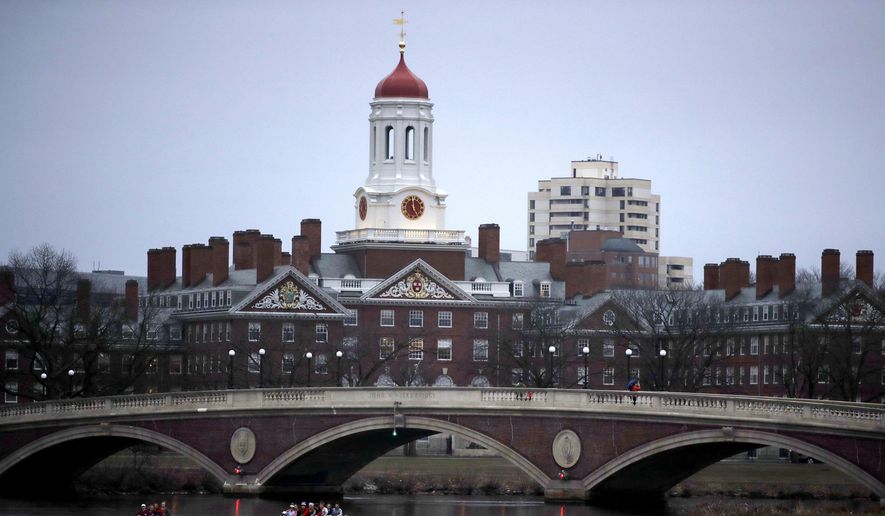Federal prosecutors Tuesday charged Harvard University’s chemistry department chairman with lying to the U.S. Department of Defense about his ties to a controversial Chinese talent recruitment program.
Prosecutors say Charles Lieber concealed almost $2 million from authorities in an alleged scheme to hide his ties to a Chinese university linked to a program accused of stealing U.S. intellectual property from businesses and universities.
By hiding his ties, Mr. Lieber was able to secure $18 million in research grant funding from the Department of Defense and National Institutes of Health, prosecutors said.
“This is not an accident or coincidence,” said U.S. Attorney Andrew E. Lelling at a press conference to announce the charges. “This is a small sample of China’s ongoing campaign to siphon off American know-how and technology for China’s gain.”
Wuhan University of Technology paid Mr. Lieber $1.74 million to establish a lab and conduct research along with a $50,000 per month salary and $158,000 in living expenses over several years, according to court documents.
Mr. Leiber is accused of failing to disclose the money received to the defense department and withholding information from government investigators.
Court documents also allege Mr. Lieber lied to Harvard’s investigators about the funds. Those lies caused Harvard to make false statements to the National Institutes of Health because its grants require the disclosure of ties with foreign governments, according to court documents.
Specifically, Mr. Lieber is accused of lying about his involvement with China’s Thousand Talents Plan, a program that recruits overseas researchers to boost the country’s science and technology.
The Trump administration has long accused the Thousand Talents of Plan of being a veiled effort to pilfer U.S. technology.
In its complaint, the FBI said the program has “rewarded individuals for stealing proprietary information and violating export controls.”
Mr. Lieber was one of three Boston-area researchers accused Tuesday by the Justice Department of working on behalf of China.
The cases were brought by the department’s China initiative, aimed at a crackdown on intellectual property theft, a top priority of the Trump administration.
Mr. Lieber is neither Chinese nor of Chinese descent, but is considered among the world’s foremost experts on nanoscience and nanotechnology, the study of matter manipulation on a molecular scale.
In 2017, Mr. Lieber was named a university professor, Harvard’s highest rank for faculty with only 26 professors holding that title. Two years later, he was bestowed the prestigious Welch Award in Chemistry.
He did not respond to requests for comment.
Harvard said Mr. Lieber has been placed on indefinite administrative leave.
“The charges brought by the U.S. government against Professor Lieber are extremely serious,” the university said in a statement. “Harvard is cooperating with federal authorities, including the National Institutes of Health, and is initiating its own review of the alleged misconduct.”
Also charged Tuesday was Zaosong Zheng, a Harvard-affiliated cancer researcher, and Yanqinq Ye, a student at Boston University.
Prosecutors say Mr. Zheng stole 21 vials of cells stolen from a laboratory at Beth Israel Deaconess Medical Center in Boston.
U.S. Authorities stopped Mr. Zheng at Logan Airport where the materials were discovered hidden in a sock inside his travel bags, according to court documents.
Mr. Zheng initially lied to authorities about the contents of his luggage, but later admitted that he intended to bring the vials to China and publish the research under his own name for a career boost.
He is charged with making false statements, visa fraud, smuggling, acting as a foreign agent and conspiracy.
Ms. Ye is accused of lying to U.S. authorities, concealing her status as a lieutenant in the People’s Liberation Army. It also alleged that she send U.S. documents and information to China.
Ms. Ye is charged with making false statements.
Sen. Rob Portman, Ohio Republican, said the charges reflect China’s unrelenting effort to pilfer U.S technology and pledged to introduce legislation to protect researchers.
“I applaud the Justice Department and the FBI for taking proactive steps towards cracking down on China’s talent recruitment programs, but we must do more to ensure that taxpayer-funded American research is not misappropriated to benefit our rivals like China,” he said.
• Jeff Mordock can be reached at jmordock@washingtontimes.com.




Please read our comment policy before commenting.